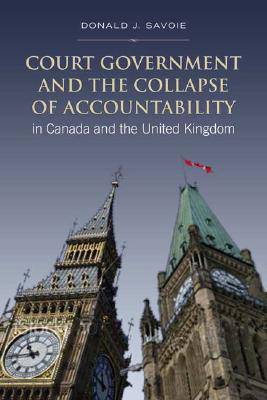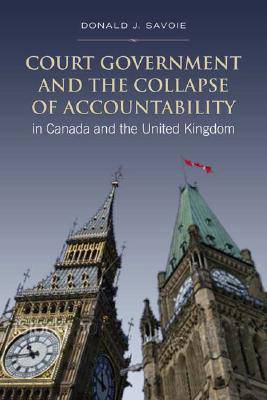
- Afhalen na 1 uur in een winkel met voorraad
- Gratis thuislevering in België vanaf € 30
- Ruim aanbod met 7 miljoen producten
- Afhalen na 1 uur in een winkel met voorraad
- Gratis thuislevering in België vanaf € 30
- Ruim aanbod met 7 miljoen producten
Court Government and the Collapse of Accountability in Canada and the United Kingdom
Donald SavoieOmschrijving
There is a consensus throughout much of the western world that the public sector is in urgent need of repair. This study seeks to understand why this is so by comparing developments in Canada and the United Kingdom. It looks to changes in values both in society and inside government, and to the relationships between politicians and civil servants at the top and between civil servants and citizens at the bottom.
Donald J. Savoie argues that both Canada and the UK now operate under court government rather than cabinet government. By court government, he means that effective power now rests with their respective prime ministers and a small group of carefully selected courtiers. For things that matter to prime ministers and their courts, the decision-making process shifts from formal to informal, involving only a handful of actors. For things that matter less to them, the decision-making process is horizontal, cumbersome, and consultative, and involves a multitude of actors from different government departments and agencies as well as a variety of individuals operating outside government.
Court governments undermine both the traditionally bureaucratic model and basic principles that have guided the development of our Westminster-Whitehall parliamentary system. Nonetheless, Canada and the United Kingdom still cling to accountability requirements better suited to the past and the traditional bureaucratic model. Savoie concludes with a call for new accountability requirements that correspond with court government as well as the new relationships between politicians and civil servants, and civil servants and citizens.
Specificaties
Betrokkenen
- Auteur(s):
- Uitgeverij:
Inhoud
- Aantal bladzijden:
- 416
- Taal:
- Engels
- Reeks:
Eigenschappen
- Productcode (EAN):
- 9780802095794
- Verschijningsdatum:
- 1/08/2008
- Uitvoering:
- Paperback
- Formaat:
- Trade paperback (VS)
- Afmetingen:
- 155 mm x 228 mm
- Gewicht:
- 689 g

Alleen bij Standaard Boekhandel
Beoordelingen
We publiceren alleen reviews die voldoen aan de voorwaarden voor reviews. Bekijk onze voorwaarden voor reviews.











